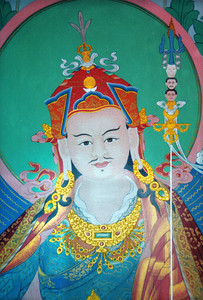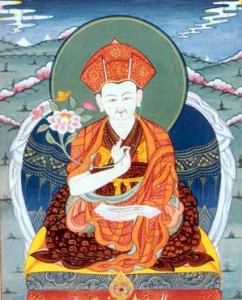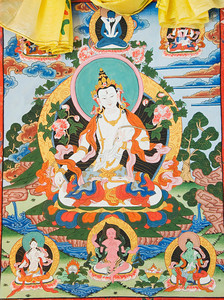White Tara
From The Spiritual Path: A Collection of Teachings by Jetsunma Ahkon Lhamo
There are no sugar daddies in this world. You cannot be the conquering hero, the savior, because you cannot conquer someone else’s mind. Each of us must purify and conquer the hatred, greed, and ignorance we hold in our own minds. No one can do it for anyone else. You can however, liberate your own mind from all egocentricity. You can follow the Buddha’s teaching and take a vow as a Bodhisattva to eliminate all poisons from your mind until the very idea of self-nature is abandoned. You can decide to liberate yourself from all desire. And you can promise to return again and again in any form necessary to help sentient beings pull themselves out of endless suffering. As part of every practice you will say: “May I attain liberation in order to benefit beings.” The compassionate motivation to be of true benefit provides us with the strength to persevere until we ourselves are awake, until we have completely transformed or purged even the tiniest seeds of poison from our minds. The motivation to be a savior has no lasting value. It requires feedback, or “warm fuzzies.” You must get beyond that need. Your love should not depend on feedback.
How can you develop love which sustains itself? How can you cultivate a fire that burns self-sustaining wood? That fire is based on the courage to understand. If your mind has deepened to the extent that you can no longer bear to be idle, knowing the profound despair of all those beings who revolve in endless cycles of suffering—you can become truly committed. Then you can begin to renounce your own causes of suffering.
Until you reach supreme Buddhahood, you must continue courageously to develop the mind of compassion at every moment. You must aspire to be of true and lasting benefit. You must offer yourself again and again. The prayer of St. Francis, “Lord, make me an instrument of thy peace,” is a good example of the aspiration of a Western Bodhisattva. Eventually, your commitment may take the form of saying: “Let me be reborn in whatever form necessary, under whatever conditions, so that beings might not suffer. If there is a need for food, let me return as food. If there is a need for shade, let me return as a tree. If there is a need for a path, let me return as a teacher. If there is a need for love, let me return as arms.”
Your job then is to purify your mind through strenuous activity. The path of Dharma is difficult. Any path that leads to enlightenment will be strenuous because enlightenment is a long way from here. You are not after a psychological “Aha!” You are aspiring to the state of Buddhahood. Your first thought should be that suffering must end. Your only concern should be that sentient beings achieve liberation.
There is a profound and simple practice that anyone can do to develop this great compassion. It turns ordinary activity into vehicles for extraordinary love. When you awake in the morning, think: “May all beings rise from the state of ignorance and be liberated until there is no more suffering.” As you brush your teeth and bathe, think: “May the suffering and seeds of suffering be washed from the minds of all beings.” Or: “May all beings be showered with the blessings of a virtuous path.” As you enter a door: “May all beings enter the door to a supreme vehicle and finally walk through the door of liberation.” Everything you do should have meaning in this way. Your entire life should be understood as a vehicle for practice.
You should dedicate all your virtuous activity, no matter how small, to the liberation of all beings. Learn to dedicate everything you do, everything. Train yourself to the point that this aspiration is constant. Once your motivation is firm, you can begin training in actual practices, in practical compassion. If you have decided to accept and follow the Buddha’s teachings, you will begin the actual practice of Dharma. If you choose not to be a Buddhist, you must still find a way to purify hatred, greed, and ignorance from your mind and the minds of others. Free of these poisons, you can become awakened; in other words, you can position yourself to be of true benefit to others.
A word of caution: some practitioners take solemn vows and make vast aspirational prayers, but then they turn around and act unkindly to others. As His Holiness Dudjom Rinpoche has suggested, practicing Dharma without kindness is like trying to get light from the painting of a lamp.
Beware also of what I call “idiot compassion.” Do you know a needy or troubled person, someone who is psychologically or emotionally disrupted? We often try to give such people what they say they need. This only increases their dependency. It gives them an opportunity to increase the garbage in their minds and lives. Sometimes compassion must be harsh. In Vajrayana, there are at least as many wrathful forms of the Buddhas as peaceful ones. Sometimes compassion must take a wrathful form. If you are pure in your motivation, you will know what to do. You will not get hooked on idiot compassion. It feels good to make others feel good. But feeling good does not always help.
If you can do anything to ease or end the suffering of beings, do it. But understand that these remedies are only temporary. Consider that your power is limited by the condition of your mind. Even though you have the karma to practice—which is very fortunate—you are still an ordinary sentient being. The Buddha, however, embodies the fully awakened mind. He does not experience the confusion or delusion arising from the belief in self. His enlightened intention is powerful in a way that yours cannot be. Despite your good intentions and efforts, if you constantly experience confusion and desire within your mindstream, you can be of little help. The best way to end the suffering of sentient beings is to liberate your mind from the causes of suffering. For if you become a realized Buddha and are then incarnated or experience rebirth in an emanation form, you can offer the means to accomplish Dharma by offering the blessing of a complete path leading to liberation. To follow the Buddha’s path requires a vast amount of merit and virtue, as well as a great deal of compassion, discipline, courage, and unselfishness. The path is arduous. To achieve the great result of Buddhahood requires great effort. But truly, there is no end to suffering except the cessation of desire. The only ultimately useful way to spend this precious human life is to attain enlightenment. You must consider from the depth of your heart that the aim of attaining enlightenment is not only to accomplish one’s own purpose, but also the purpose of others. When you have seen that all sentient beings endure needless suffering, when you cannot bear even the thought of their condition and are determined to bring about its end, you are ready for Dharma.
© Jetsunma Ahkön Lhamo



